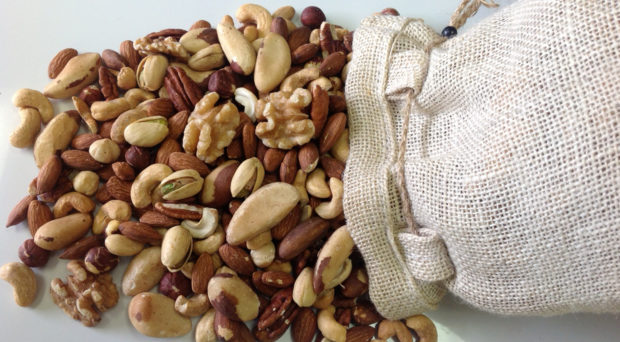
Albert Einstein once said that a clever person solves a problem while a wise person avoids it. Extrapolating this to the context of medicine and human health, disease prevention will always be better than disease cure, and even more when the risk of several chronic diseases and death are at stake.
The understanding of the nutrients and foods likely to promote heart health has grown substantially in the past decades. In spite of the relatively high content of energy and fat in nuts, their consumption has consistently been associated with lower risk of coronary heart disease in prospective cohort studies.
A few performed randomized trials clearly support this conclusion [1, 2]. And, in contrast to what could be expected, evidence suggests that people who consume nuts regularly gain less weight and are at lower risk of abdominal obesity [3]. Furthermore, it seems that the protective effects of nuts are not limited to the cardiovascular system.
Beyond cardiovascular benefits

A recent comprehensive systematic review and dose-response meta-analysis by Aune et al. published in BMC Medicine, encompassing 29 publications from 20 high quality cohort studies and involving a total of 819,448 participants, has revealed that an increase of a handful (28 grams) of nuts per day leads to a substantial relative reduction in the risk of coronary heart disease (29%), stroke (7%), cardiovascular disease (21%) and all-cause mortality (22%). The authors estimated that as many as 4.4 million deaths in one year (2013) were attributed to low nut consumption.
But, the particularly noteworthy results from this systematic review are those concerning the relationship between nut consumption and total cancer incidence and other non-cardiovascular causes of death, which had not been systematically summarized previously.
The authors observed important reductions in the risk of total cancer incidence (15%) and mortality from respiratory disease (52%), diabetes (39%), and infectious disease (75%) for a handful/day in nut intake versus almost never consuming nuts.
Because only observational studies were included in the review and some of the endpoints assessed were based on a limited number of studies, these estimates need to be interpreted with caution. Nevertheless, the findings are a call to further research into the non-cardiovascular benefits of nuts.
Because unity makes strength
The positive effects of nuts might be mediated through multiple biological pathways – such as reductions in oxidative stress, inflammation, vascular reactivity or cell damage – most likely as a result of the synergistic interactions between the numerous bioactive constituents of nuts.
Nuts are rich sources of mono- and polyunsaturated fatty acids, high-quality vegetable protein, arginine, fiber, calcium, magnesium, potassium and selenium minerals, antioxidant vitamins, folate and other bioactive compounds such as tocopherols, phytosterols and natural phenols.
Combining evidence

A properly conducted systematic review and meta-analysis is a highly valuable resource, as long as it consists of compiled existing findings with a high degree of transparency. This allows the reader to follow each phase of the process, and to judge the quality of the review and the potential for bias.
The present meta-analysis was conducted according to the PRISMA criteria for reporting of meta-analyses of observational studies. Accordingly, the authors conducted a comprehensive and up-to-date search, specifying inclusion and exclusion criteria and carefully considering the methodological quality of included primary studies, with the excluded studies listed. They also reported an empirical assessment of publications bias and addressed the possible reasons why some studies differ in their results.
In light of these findings (and while waiting for further evidence provided by intervention studies), just adding a handful of nuts to the diet seems to be wise and might add more years to our life with a better quality of life.
- Estruch, R., et al., Primary prevention of cardiovascular disease with a Mediterranean diet. N Engl J Med, 2013. 368(14): p. 1279-90.
- Del Gobbo, L.C., et al., Effects of tree nuts on blood lipids, apolipoproteins, and blood pressure: systematic review, meta-analysis, and dose-response of 61 controlled intervention trials. Am J Clin Nutr, 2015. 102(6): p. 1347-56.
- Estruch, R., et al., Effect of a high-fat Mediterranean diet on bodyweight and waist circumference: a prespecified secondary outcomes analysis of the PREDIMED randomised controlled trial. Lancet Diabetes Endocrinol, 2016. 4(8): p. 666-76.
Comments